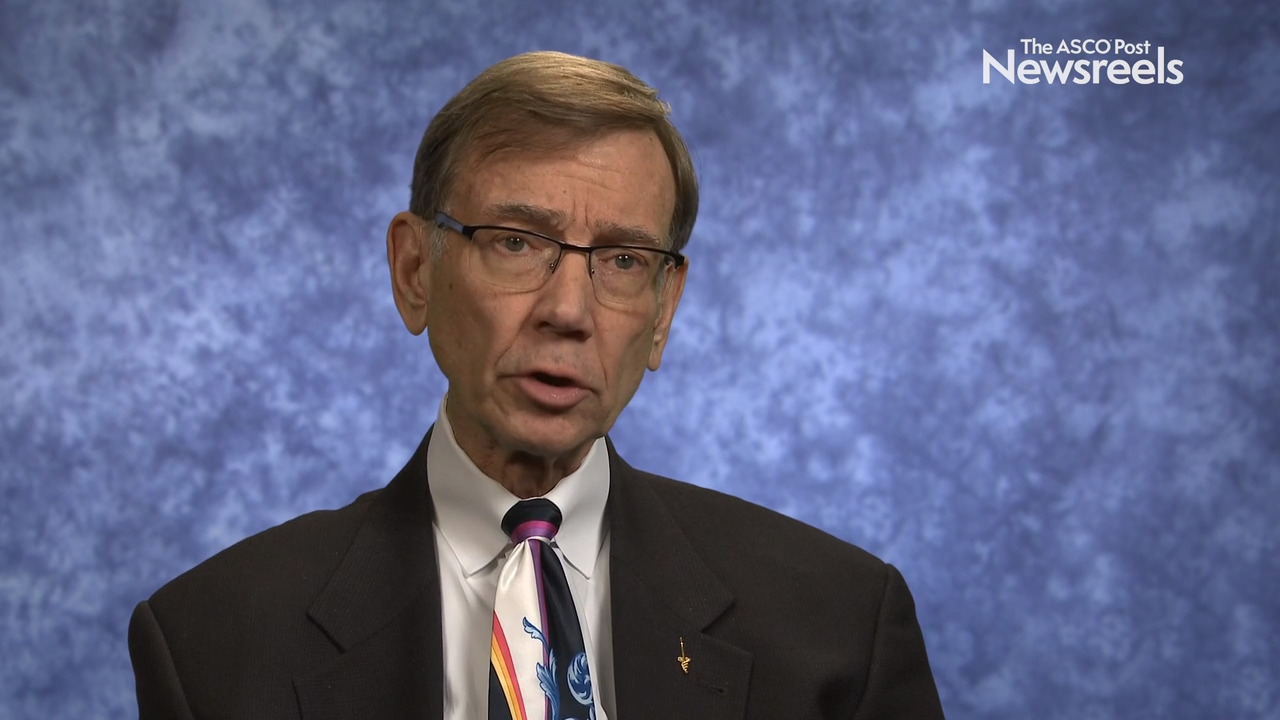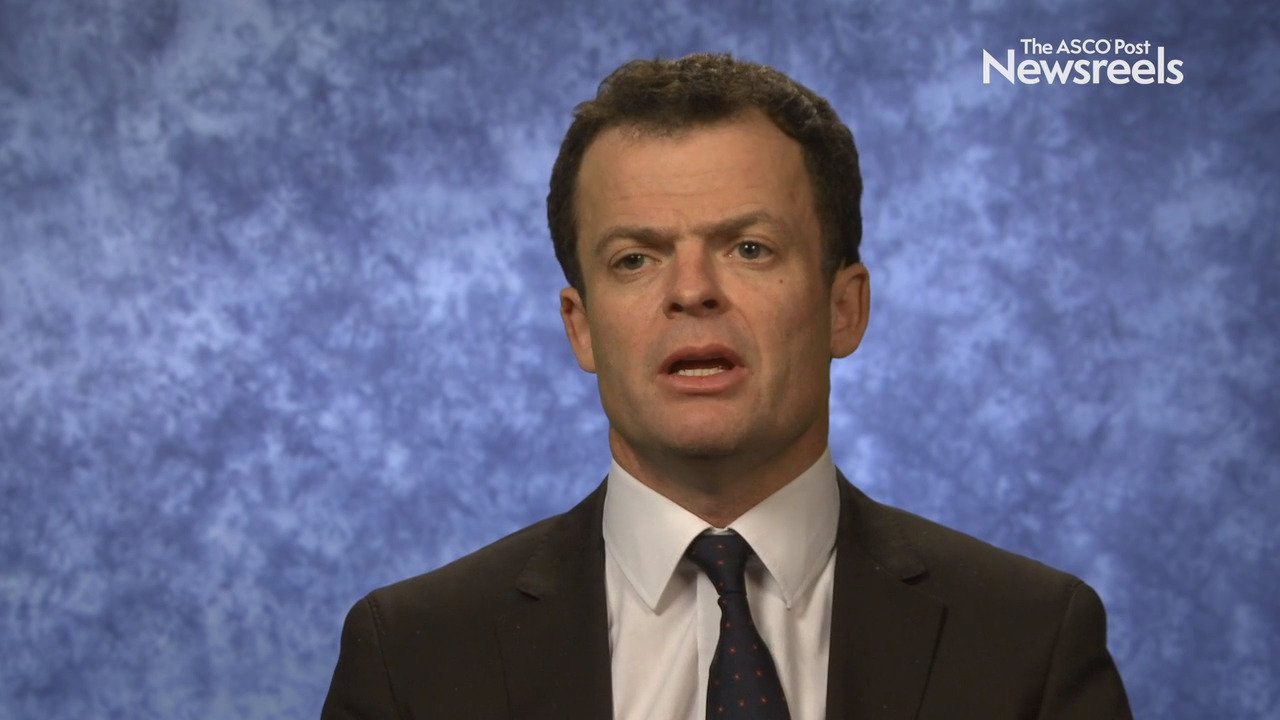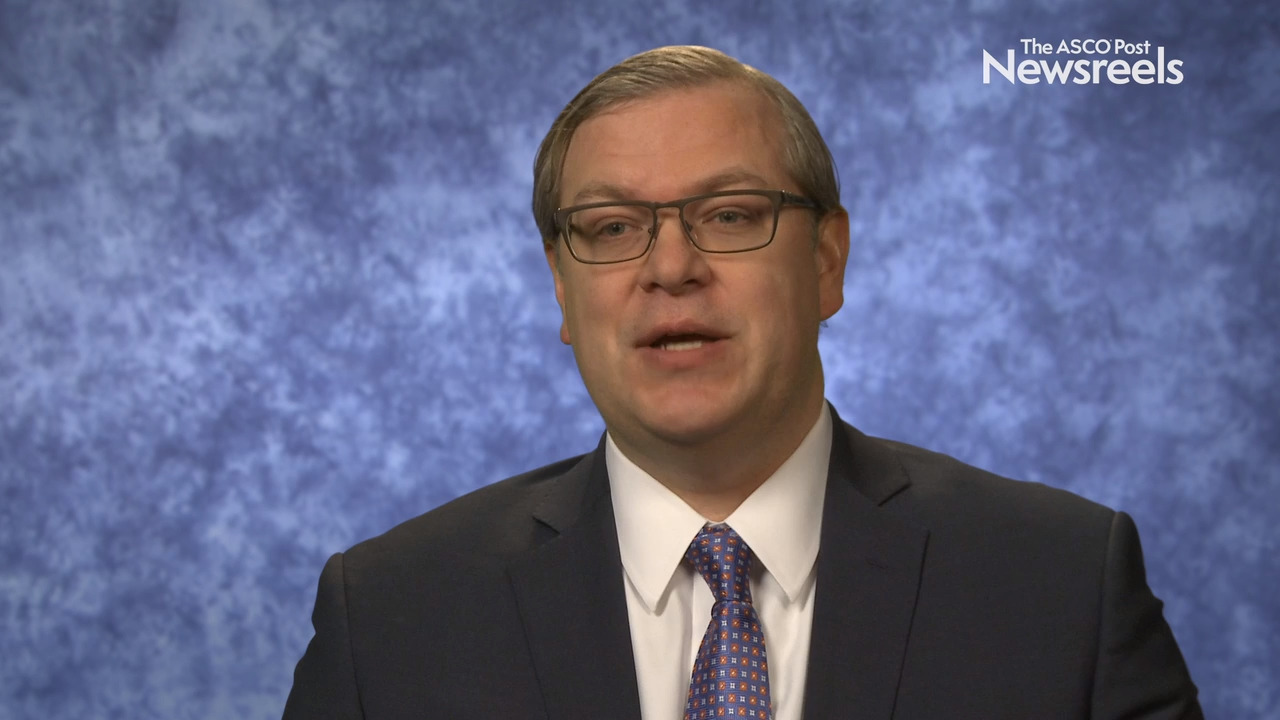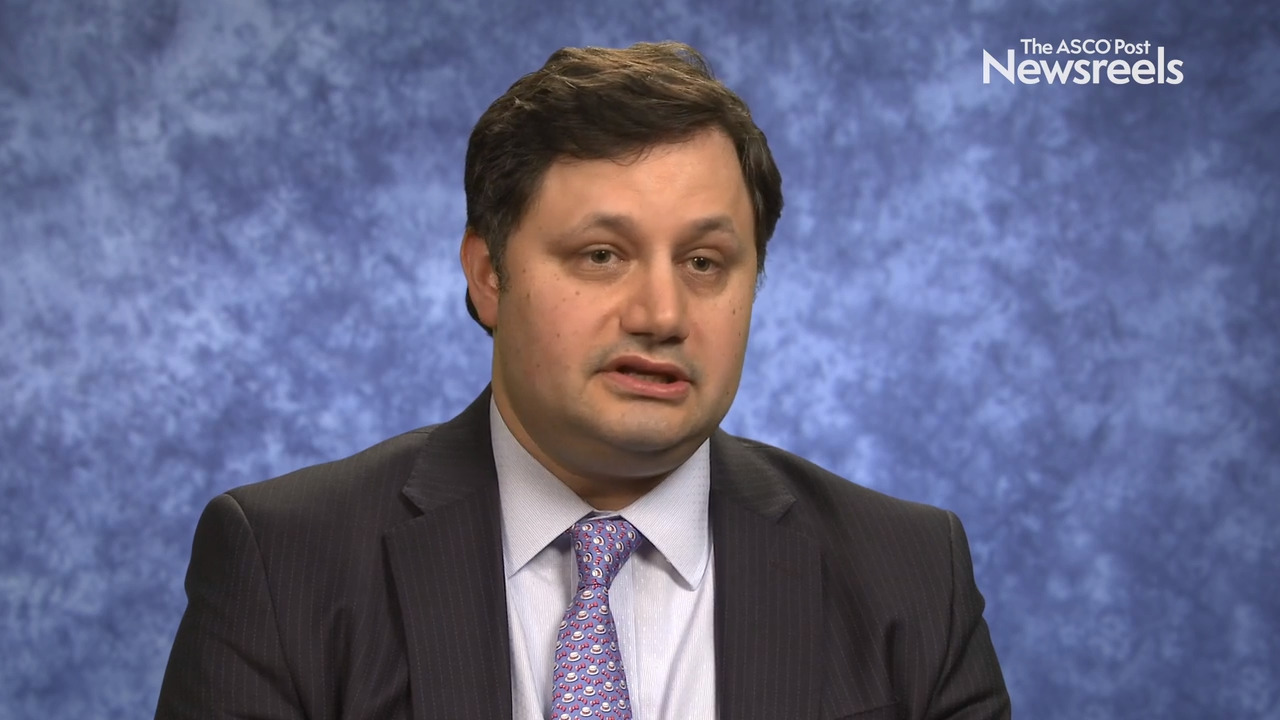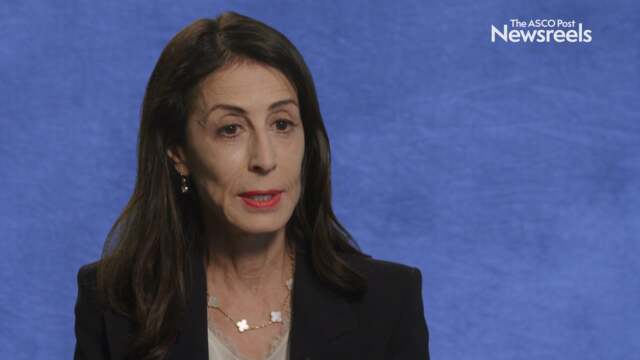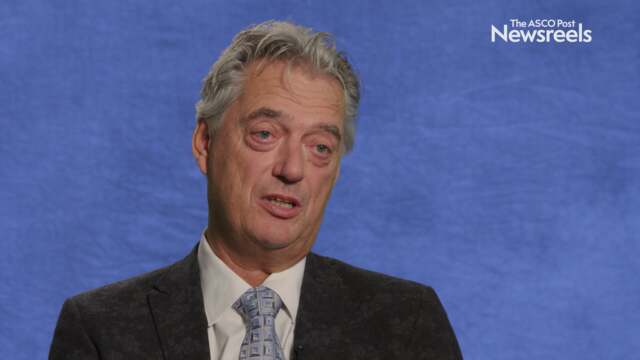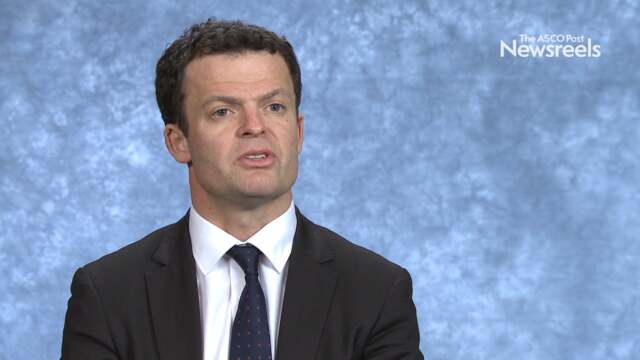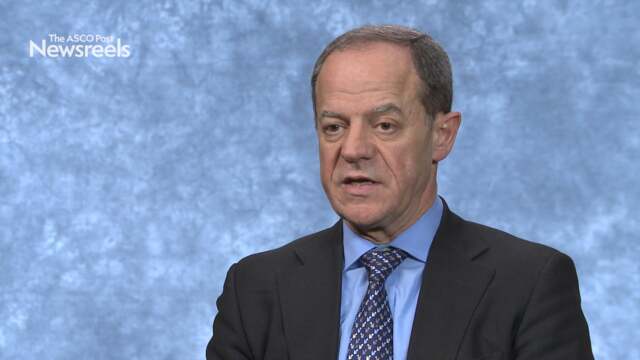Antibody-Drug Conjugate Shows Activity in Heavily Pretreated Bladder Cancer
PRELIMINARY EVIDENCE suggests that the antibody-drug conjugate sacituzumab govitecan is active in patients previously treated with chemotherapy or checkpoint inhibitor therapy for metastatic urothelial cancer. These results from a phase I/II basket study of this agent were presented at the 2019...
Conference Highlights From the 2019 Gastrointestinal and Genitourinary Cancers Symposiums
THIS YEAR saw a huge turnout and a large number of scientific abstracts presented at both the 2019 Gastrointestinal (GI) Cancers Symposium, held on January 17–19, and the 2019 Genitourinary (GU) Cancers Symposium, held on February 14–16, both in San Francisco. The GU Cancers Symposium attracted...
Expert Point of View: Matthew I. Milowsky, MD
FORMAL STUDY discussant Matthew I. Milowsky, MD, of the University of North Carolina, Lineberger Comprehensive Cancer Center, Chapel Hill, said there had been few drug approvals in advanced bladder cancer until 5 new checkpoint inhibitors were approved over the past 2 years. “Although these agents...
Antibody-Drug Conjugate Shows Activity in Heavily Pretreated Bladder Cancer
PRELIMINARY EVIDENCE suggests that the antibody-drug conjugate sacituzumab govitecan is active in patients previously treated with chemotherapy or checkpoint inhibitor therapy for metastatic urothelial cancer. These results from a phase I/II basket study of this agent were presented at the 2019...
Johns Hopkins Greenberg Bladder Cancer Institute Awards Research Grants to Women’s Bladder Cancer Projects
The Johns Hopkins Greenberg Bladder Cancer Institute awarded research grants to four projects that focus on bladder cancer treatments in women and how biology could offer new targets for cancer therapy.The Institute awards grants of $25,000 to $50,000. David McConkey, PhD, Director of the...
EAU 2019: Early Menopause in Smokers May Be Linked to Increased Risk of Bladder Cancer
New research has shown that experiencing menopause before the age of 45 is associated with a higher risk of bladder cancer; this higher risk was even more notable in smokers. The study, which looked at health outcomes in more than 220,000 patients, was presented by Abufaraj et al at the European...
Nicholas Vogelzang, MD, on Urothelial Cancer: Results From a Trial on Lenvatinib Plus Pembrolizumab
Nicholas Vogelzang, MD, of the Comprehensive Cancer Centers of Nevada, discusses phase Ib/II findings on pembrolizumab and lenvatinib given to 20 patients with metastatic transitional cell carcinoma of the bladder who had received no prior checkpoint inhibitor therapy (Abstract 11).
Thomas Powles, MD, PhD, on Urothelial Carcinoma: Results From the RANGE Trial on Ramucirumab and Docetaxel
Thomas Powles, MD, PhD, of Queen Mary University of London, discusses phase III study findings on ramucirumab plus docetaxel vs placebo plus docetaxel in patients with advanced platinum-refractory urothelial carcinoma (Abstract 353).
Jason A. Efstathiou, MD, DPhil, on Bladder Cancer: What Is the Best Treatment Option?
Jason A. Efstathiou, MD, DPhil, of Massachusetts General Hospital, discusses the debate over treating muscle-invasive bladder cancer with radical cystectomy vs trimodality therapy.
Brian C. Baumann, MD, on Bladder Cancer: Trial Results on Adjuvant Chemoradiotherapy vs Adjuvant Radiotherapy Alone
Brian C. Baumann, MD, of Washington University School of Medicine, discusses phase III study findings on adjuvant sequential chemotherapy plus radiotherapy vs adjuvant radiotherapy alone for locally advanced bladder cancer after radical cystectomy (Abstract 351).
2019 GU Cancers Symposium: Adjuvant Sequential Chemotherapy Plus Radiotherapy vs Radiotherapy Alone for Locally Advanced Bladder Cancer
A phase III Egyptian trial presented by Zaghloul et al (Abstract 351) at the 2019 Genitourinary Cancers Symposium focused on the benefit of adjuvant chemotherapy in patients with locally advanced bladder cancer treated with postoperative radiotherapy. Researchers compared postoperative radiotherapy ...
Bladder Cancer: Strategies to Address Checkpoint Inhibitor Failure
CHECKPOINT INHIBITORS have rapidly become the standard of care as second-line treatment, and in some patients first-line treatment, of advanced bladder cancer. However, the majority of patients do not respond and eventually experience disease progression; these patients will need subsequent...
Bladder-Sparing Treatment Regimens for Muscle-Invasive Bladder Cancer
In a phase II trial (NRG/RTOG 0712) reported in the Journal of Clinical Oncology, Coen et al found that bladder-sparing treatment with twice-daily radiation plus fluorouracil/cisplatin (FCT) or once-daily radiation plus gemcitabine (GD) produced similar distant metastasis-free survival in patients...
FDA Pipeline: What’s New in Biosimilars, Drug Reviews, Designations, and More
The U.S. Food and Drug Administration (FDA) recently issued the following new approvals and designations: Approval for Pegfilgrastim Biosimilar The FDA recently approved a pegfilgrastim biosimilar, pegfilgrastim-cbqv (Udenyca). The biosimilar has been approved to decrease the incidence...
Expert Point of View: Shahrokh Shariat, MD
“BACILLUS CALMETTE-GUÉRIN (BCG) failures are quite common, with a 66% recurrence rate at 5 years, and about 25% of patients will have disease progression,” explained formal discussant Shahrokh Shariat, MD, Chair of the Department of Urology at Medical University, Vienna, and Adjunct Professor at...
Pembrolizumab Shows Antitumor Activity in Non–Muscle Invasive Bladder Cancer
THE ANTI–PROGRAMMED cell death protein 1 (anti–PD-1) checkpoint inhibitor pembrolizumab (Keytruda) was found to have antitumor activity in patients with high-risk non–muscle invasive bladder cancer who were nonresponsive to bacillus Calmette-Guérin (BCG), according to the preliminary results of the ...
PURE-01 Trial: Neoadjuvant Immunotherapy in Muscle-Invasive Bladder Carcinoma
In the Italian phase II PURE-01 trial reported in the Journal of Clinical Oncology, Necchi et al found that neoadjuvant pembrolizumab (Keytruda) before radical cystectomy in muscle-invasive bladder carcinoma produced complete pathologic response (pT0) in 42% of patients, with pT0 being more common...
Cora N. Sternberg, MD, on Renal and Bladder Cancers: Focus on Immunotherapy
Cora N. Sternberg, MD, of San Camillo-Forlanini Hospital and the Israel Englander Institute of Precision Medicine at Weill Cornell, discusses results from the phase III CheckMate-025 study on nivolumab vs everolimus for mRCC; the CheckMate-214 study on nivolumab, ipilimumab, and sunitinib for treatment-naive advanced or metastatic clear-cell RCC; and immunotherapy for urothelial cancer for both first- line cisplatin-ineligible and second-line therapy after cisplatin chemotherapy.
Ronald de Wit, MD, PhD, on Bladder Cancer: Results From KEYNOTE-057
Ronald de Wit, MD, PhD, of the University Medical Center Rotterdam, discusses phase II findings on the efficacy of pembrolizumab in bacillus Calmette-Guérin–unresponsive bladder cancer with high risk for disease progression.
Outcomes With Neoadjuvant Chemotherapy Regimens in Muscle-Invasive Bladder Cancer
In a single-center analysis reported in JAMA Oncology, Peyton et al found that neoadjuvant dose-dense methotrexate, vinblastine, doxorubicin, and cisplatin (ddMVAC) produced better outcomes than other standard neoadjuvant regimens in patients undergoing radical cystectomy for muscle-invasive...
Recent Drug Approvals and Revisions in Prescribing Information
THE U.S. FOOD AND DRUG ADMINISTRATION (FDA) issued the following approvals and prescribing information revisions in August 2018. Lenvatinib Approved for Unresectable Hepatocellular Carcinoma THE FDA approved lenvatinib (Lenvima) for the first-line treatment of patients with unresectable...
FDA Updates Prescribing Information for Pembrolizumab and Atezolizumab in Urothelial Carcinoma
On August 16, 2018, the U.S. Food and Drug Administration (FDA) updated the prescribing information for pembrolizumab (Keytruda) and atezolizumab (Tecentriq) to require the use of an FDA-approved companion diagnostic test to determine programmed cell death ligand 1 (PD-L1) levels in tumor tissue...
VB4-845 Granted Fast Track Designation by FDA for Treatment of Non–Muscle Invasive Bladder Cancer
The U.S. Food and Drug Administration (FDA) has granted Fast Track designation to VB4-845 for the treatment of bacillus Calmette-Guérin (BCG)–unresponsive, high-grade, non–muscle invasive bladder cancer. VB4-845 is currently being evaluated in a phase III registration...
No Survival Benefit for Atezolizumab inPD-L1–Positive Urothelial Cancer
As reported in The Lancet by Thomas Powles, MD, of Barts Cancer Institute, Queen Mary University of London, and colleagues, the phase III IMvigor211 trial showed no survival benefit for atezolizumab vs physician’s choice of chemotherapy in platinum-treated locally advanced or metastatic urothelial...
Large Disparities in Cancer Mortality Rates Found Among Different Racial/Ethnic Populations in New York State
According to the American Cancer Society, cancer is the leading cause of death for Hispanics and Asian/Pacific Islanders in the United States. However, their cancer burden is less than that of non-Hispanic whites and especially non-Hispanic blacks, who bear the most disproportionate share of the...
STAG2 Genetic Test Could Reduce Overtreatment in Some Patients With Bladder Cancer
A new genetic test in bladder cancer could be key to reducing the cost of care while avoiding overtreatment in some patients, according to research published by Waldman et al in Clinical Cancer Research. Deciding whether to treat bladder cancer aggressively can be difficult—predictive...
FDA Restricts Use of Pembrolizumab or Atezolizumab to Treat Urothelial Cancer Due to Efficacy Concerns in Some Patients
As of June 20, the U.S. Food and Drug Administration (FDA) has restricted the use of pembrolizumab (Keytruda) and atezolizumab (Tecentriq) for patients with locally advanced or metastatic urothelial cancer who are not eligible for cisplatin-containing therapy. The restriction results from a...
2018 ASCO: Erdafitinib Shows Activity in FGFR3-Mutated Urothelial Cancer
In an international phase II trial led by researchers at The University of Texas MD Anderson Cancer Center, treatment with the oral FGFR inhibitor erdafitinib was well tolerated and achieved a robust response for patients with metastatic urothelial cancers harboring mutations in the FGFR3...
Toni K. Choueiri, MD, and Jonathan E. Rosenberg, MD: Bladder Cancer Roundup
Toni K. Choueiri, MD, of Dana-Farber Cancer Institute, and Jonathan E. Rosenberg, MD, of Memorial Sloan Kettering Cancer Center, discuss their perspectives on the top abstracts in bladder cancer presented at the 2018 ASCO Annual Meeting (Abstracts 4507, 4506, 4503, 4504).
FDA Identifies Efficacy Issue in Clinical Trials of Pembrolizumab or Atezolizumab as Monotherapy in Urothelial Cancer With Low Expression of PD-L1
On May 18, the U.S. Food and Drug Administration (FDA) alerted health-care professionals, oncology clinical investigators, and the public about decreased survival associated with the use of pembrolizumab (Keytruda) or atezolizumab (Tecentriq) as monotherapy in clinical trials to treat patients with ...
Dose-Dense Neoadjuvant Chemotherapy in Muscle-Invasive Bladder Cancer
In a phase II trial reported in the Journal of Clinical Oncology, Iyer et al found that dose-dense neoadjuvant gemcitabine plus cisplatin produced a high response rate and was generally well tolerated in patients with planned radical cystectomy for muscle-invasive bladder cancer. Study Details In ...
Intravesical Instillation of Gemcitabine Postsurgery May Aid in Preventing Bladder Cancer Recurrence
Flushing the bladder with a common chemotherapy drug immediately after surgery significantly reduces the chances of bladder cancer returning, according to a study by Messing et al published in JAMA and led by SWOG. First author Edward M. Messing, MD, is Professor of Urology and...
Durvalumab in Locally Advanced or Metastatic Urothelial Carcinoma
Updated results of a phase I/II study of durvalumab (Imfinzi) in locally advanced or metastatic urothelial carcinoma were reported by Thomas Powles, MD, of Barts Cancer Institute, Queen Mary University of London, and colleagues in JAMA Oncology. Data from the ongoing study supported the recent...
Results From Phase III RANGE Study of Ramucirumab in Advanced or Metastatic Urothelial Cancer
Eli Lilly and Company recently announced additional results from its global, randomized, double-blind, placebo-controlled phase III RANGE trial evaluating ramucirumab (Cyramza) in combination with docetaxel in patients with locally advanced or unresectable or metastatic urothelial carcinoma whose...
Health-Related Quality-of-Life Analysis of Anti–PD-1 Therapy vs Chemotherapy in Advanced Urothelial Cancer
As reported by Vaughn et al in the Journal of Clinical Oncology, a health-related quality-of-life analysis from the phase III KEYNOTE-045 trial in previously treated advanced urothelial cancer showed that patients treated with the anti–programmed cell death protein 1 immunotherapy...
FDA Grants Fast Track Designation for TAR-200 in Muscle-Invasive Bladder Cancer
On April 3, the U.S. Food and Drug Administration (FDA) granted Fast Track designation for TAR-200, a gemcitabine-releasing intravesical system (GemRIS), for the treatment of patients with organ-confined or locally advanced muscle-invasive bladder cancer who are unfit for curative-intent therapy....
GU Symposium Focuses on Prognostic Model in Urothelial Cancer, Novel Therapies for Prostate and Kidney Cancers
THE 2018 GENITOURINARY Cancers Symposium hosted an international audience of oncologists and other stakeholders to hear about the latest advances in the field. We have included coverage of many of the top news stories from the meeting in previous issues of The ASCO Post. Here are summaries of a few ...
FDA Grants Breakthrough Therapy Designation to Enfortumab Vedotin for Locally Advanced or Metastatic Urothelial Cancer
On March 26, the U.S. Food and Drug Administration (FDA) granted Breakthrough Therapy designation to enfortumab vedotin, an antibody-drug conjugate (ADC), for patients with locally advanced or metastatic urothelial cancer who were previously treated with checkpoint inhibitors. Breakthrough Therapy ...
EAU 2018: Survey Shows Greater Suicide Rate in Patients With Urologic Cancers
A major UK survey has shown that patients with urologic cancer—such as prostate, bladder, or kidney cancer—are five times more likely to commit suicide than people without cancer. The analysis also shows that patients with cancer generally are around three times more likely to commit...
Alterations in DNA Damage Response and Repair Genes and Response to PD-1/PD-L1 Inhibitors in Advanced Urothelial Cancer
In a study reported in the Journal of Clinical Oncology, Teo et al found that alterations in DNA damage response and repair (DDR) genes, particularly known or likely deleterious alterations, were associated with response to programmed cell death protein 1 (PD-1)/programmed cell death ligand 1...
Pembrolizumab Survival Advantage Upheld in Advanced Urothelial Carcinoma
Patients with recurrent urothelial cancer had sustained improvement in overall survival at 2 years after they received second-line treatment with pembrolizumab (Keytruda) vs chemotherapy, according to an updated survival analysis of the phase III KEYNOTE-045 trial presented at the 2018...
FDA Grants Breakthrough Therapy Designation to Erdafitinib for the Treatment of Metastatic Urothelial Cancer
On March 15, the U.S. Food and Drug Administration (FDA) granted Breakthrough Therapy designation to erdafitinib for the treatment of urothelial cancer. Urothelial cancer, most frequently in the bladder, is the sixth most common type of cancer in the United States. A Breakthrough Therapy ...
EXPERT POINT OF VIEW: Timothy Gilligan, MD
“POUT IS an impressive study, given that the authors were able to complete a trial in this relatively rare cancer. We still need overall survival data to determine the role of adjuvant chemotherapy for upper tract urothelial cancer. We need to know if it makes people live longer or have a better...
Adjuvant Chemotherapy for Upper Tract Urothelial Cancer
ADJUVANT CHEMOTHERAPY achieved robust improvements in disease-free survival and metastasis-free survival compared with surveillance in the phase III POUT study of patients with upper tract urothelial cancer.1 Further, there was an early trend toward improved overall survival with adjuvant...
Long-Term Outcomes With PD-L1 Inhibition in Metastatic Urothelial Cancer
As reported by Petrylak et al in JAMA Oncology, long-term follow-up of patients in a phase I study expansion cohort indicated enduring clinical benefit and maintained tolerability of atezolizumab (Tecentriq) in patients with metastatic urothelial carcinoma. Study Details The study involved...
Gregory R. Pond, PhD, on Urothelial Cancer: Advance in Prognosis
Gregory R. Pond, PhD, of McMaster University, discusses a new six-factor prognostic model for patients with advanced urothelial carcinoma receiving post platinum atezolizumab (Abstract 413).
Jonathan E. Rosenberg, MD, on Urothelial Carcinoma: Results From the CheckMate 032 Trial
Jonathan E. Rosenberg, MD, of Memorial Sloan Kettering Cancer Center, discusses longer-term efficacy and safety findings on nivolumab monotherapy in metastatic urothelial carcinoma (Abstract 414).
Thomas Powles, MD, on Urothelial Carcinoma: Results From the IMvigor211 Trial
Thomas Powles, MD, of Barts Cancer Institute, discusses phase III study findings on atezolizumab vs chemotherapy in platinum-treated locally advanced or metastatic urothelial carcinoma, with an emphasis on immune biomarkers, tumor mutational burden, and clinical outcomes (Abstract 409).
John J. Coen, MD, on Bladder Cancer: Results From the NRG/RTOG 0712 Trial
John J. Coen, MD, of 21st Century Oncology, discusses phase II study findings on selective bladder preservation with twice-daily radiation plus fluorouracil/cisplatin or daily radiation plus gemcitabine for patients with muscle-invasive bladder cancer (Abstract 408).
Joaquim Bellmunt, MD, PhD, on Urothelial Cancer: Results From the KEYNOTE-045 Trial
Joaquim Bellmunt, MD, PhD, of the Dana-Farber Cancer Institute, discusses phase III 2-year follow-up findings on pembrolizumab vs investigator’s choice (paclitaxel, docetaxel, or vinflunine) in recurrent, advanced urothelial cancer (Abstract 410).
